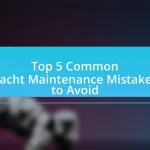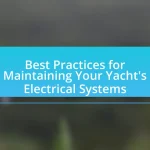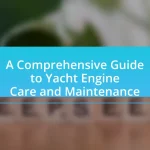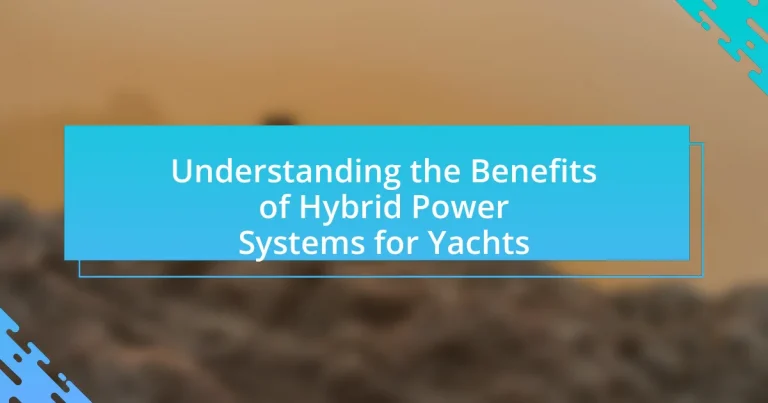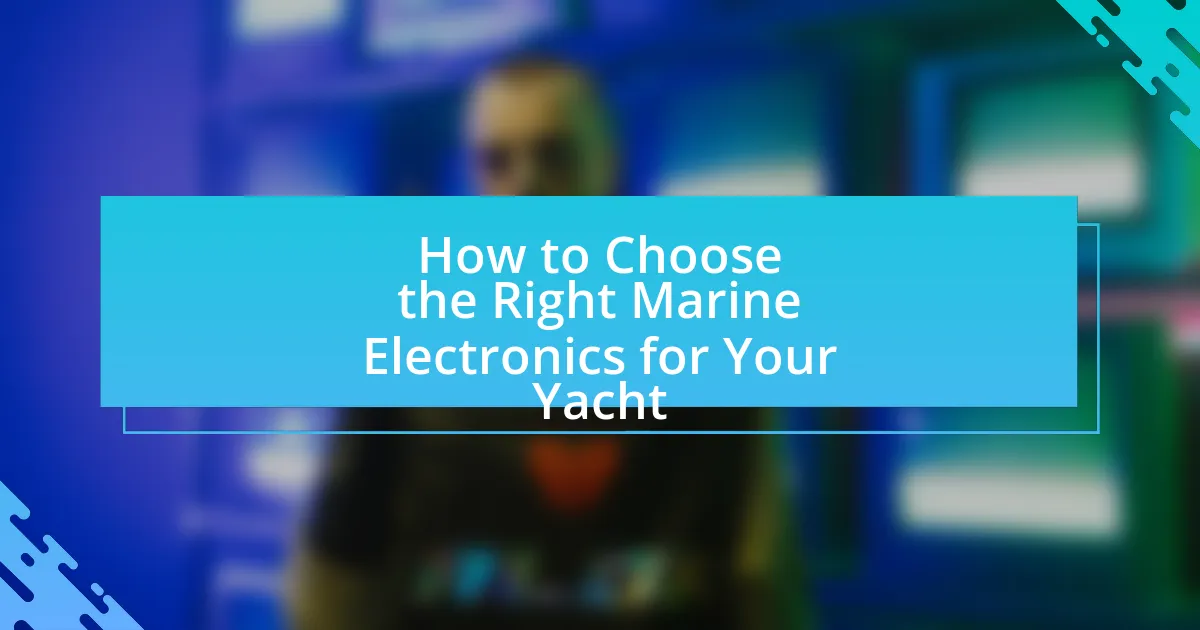Hybrid power systems for yachts represent an innovative energy solution that combines traditional fuel-based engines with electric propulsion and energy storage technologies. These systems enhance fuel efficiency and reduce emissions, allowing yachts to operate sustainably by utilizing electric power at lower speeds and during idle periods. Key components include diesel generators, electric motors, batteries, and renewable energy sources like solar panels. The article explores the differences between hybrid and traditional power systems, their environmental benefits, financial advantages, and best practices for maintenance, while also addressing common misconceptions and challenges associated with their implementation in the yachting industry.
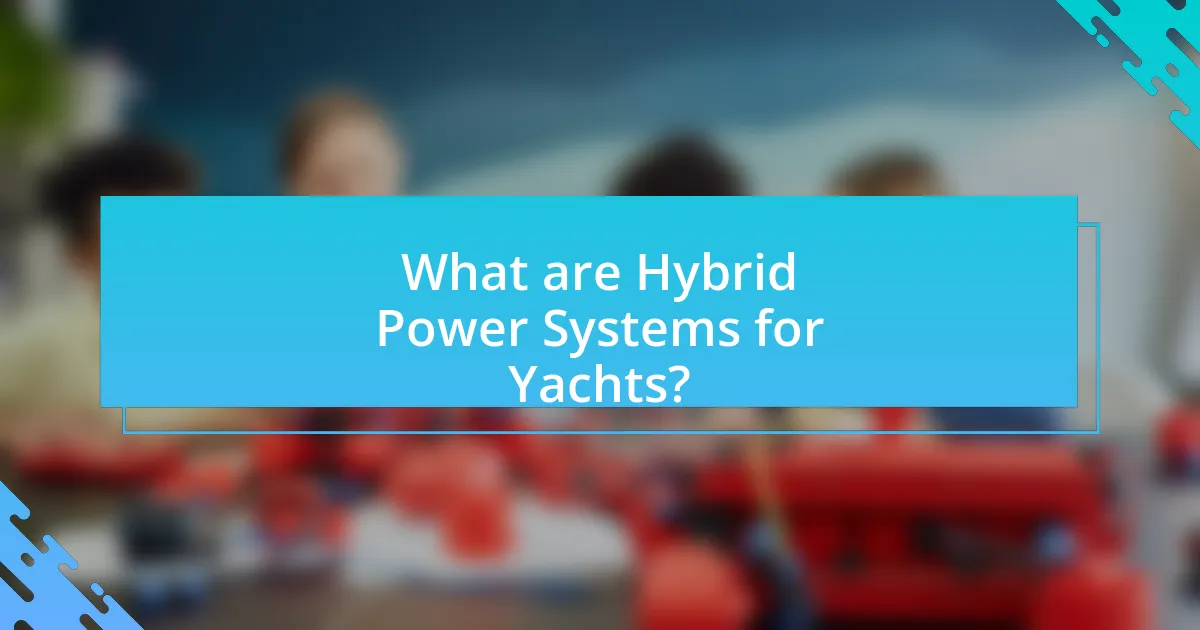
What are Hybrid Power Systems for Yachts?
Hybrid power systems for yachts are integrated energy solutions that combine traditional fuel-based engines with electric propulsion and energy storage technologies. These systems enhance fuel efficiency and reduce emissions by allowing yachts to operate on electric power at lower speeds or during idle periods, while the combustion engine can be utilized for higher speeds or when additional power is needed. The implementation of hybrid systems can lead to a reduction in fuel consumption by up to 30%, as reported by various marine industry studies, demonstrating their effectiveness in promoting sustainability in yachting.
How do Hybrid Power Systems differ from traditional power systems?
Hybrid power systems differ from traditional power systems primarily by integrating multiple energy sources, such as diesel generators and renewable energy sources like solar or wind. This integration allows hybrid systems to optimize energy efficiency, reduce fuel consumption, and lower emissions compared to traditional systems that typically rely solely on fossil fuels. For instance, a study by the International Renewable Energy Agency (IRENA) highlights that hybrid systems can achieve up to 30% fuel savings in marine applications, demonstrating their effectiveness in enhancing sustainability and operational efficiency.
What components make up a Hybrid Power System for yachts?
A Hybrid Power System for yachts typically consists of several key components: a diesel generator, electric motors, batteries, a power management system, and renewable energy sources such as solar panels or wind turbines. The diesel generator provides primary power, while electric motors enable propulsion and can operate independently or in conjunction with the generator. Batteries store energy for use when needed, enhancing efficiency and reducing emissions. The power management system optimizes the distribution of energy among these components, ensuring seamless operation. Renewable energy sources contribute additional power, further increasing sustainability. These components work together to create an efficient and environmentally friendly power solution for yachts.
How do energy sources in Hybrid Power Systems work together?
Energy sources in Hybrid Power Systems work together by integrating multiple generation methods, such as diesel generators, solar panels, and batteries, to optimize energy efficiency and reliability. This integration allows for the simultaneous use of renewable and non-renewable energy sources, enabling the system to switch between them based on demand and availability. For instance, during peak energy demand, the diesel generator can provide additional power while solar panels contribute during daylight hours, and batteries can store excess energy for later use. This collaborative approach enhances fuel efficiency, reduces emissions, and ensures a continuous power supply, making hybrid systems particularly beneficial for yachts where energy management is crucial.
Why are Hybrid Power Systems becoming popular in the yachting industry?
Hybrid Power Systems are becoming popular in the yachting industry primarily due to their ability to enhance fuel efficiency and reduce emissions. These systems combine traditional diesel engines with electric propulsion, allowing yachts to operate more sustainably and economically. According to a report by the International Maritime Organization, hybrid systems can reduce fuel consumption by up to 30%, significantly lowering operational costs and environmental impact. Additionally, the growing regulatory pressure for greener technologies in marine operations further drives the adoption of hybrid power solutions in yachting.
What environmental benefits do Hybrid Power Systems provide?
Hybrid Power Systems provide significant environmental benefits by reducing greenhouse gas emissions and minimizing reliance on fossil fuels. These systems typically combine renewable energy sources, such as solar or wind, with traditional generators, leading to lower carbon footprints. For instance, a study by the International Maritime Organization found that hybrid systems can reduce emissions by up to 30% compared to conventional power systems in marine applications. Additionally, they contribute to decreased noise pollution and lower marine ecosystem disruption, enhancing the overall sustainability of yacht operations.
How do Hybrid Power Systems enhance fuel efficiency?
Hybrid Power Systems enhance fuel efficiency by integrating multiple energy sources, such as diesel engines and electric motors, allowing for optimized power management. This combination enables the system to operate at the most efficient load and speed, reducing fuel consumption significantly. For instance, during low-speed operations, the electric motor can take over, minimizing reliance on the diesel engine, which is less efficient at low loads. Studies have shown that yachts equipped with hybrid systems can achieve fuel savings of up to 30% compared to traditional propulsion systems, demonstrating the effectiveness of this technology in enhancing fuel efficiency.
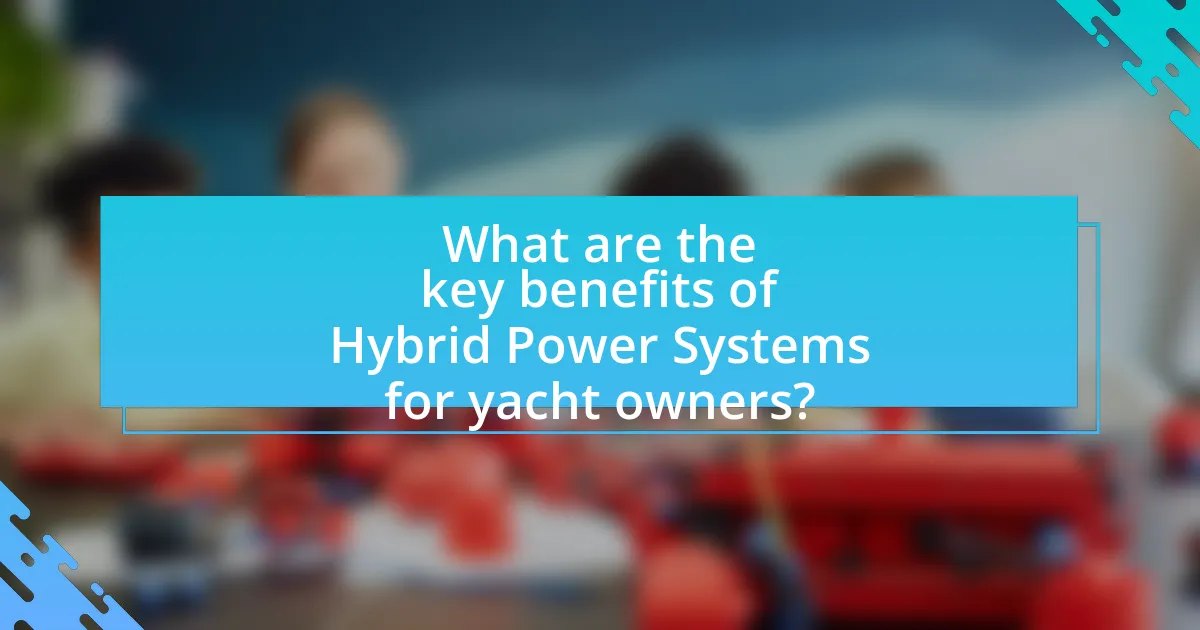
What are the key benefits of Hybrid Power Systems for yacht owners?
Hybrid Power Systems provide yacht owners with enhanced fuel efficiency, reduced emissions, and increased operational flexibility. These systems combine traditional engines with electric propulsion, allowing for quieter operation and lower environmental impact, which is increasingly important as regulations on emissions tighten. Additionally, hybrid systems can optimize energy use by switching between power sources based on demand, leading to significant cost savings on fuel. According to a study by the International Maritime Organization, hybrid systems can reduce fuel consumption by up to 30%, demonstrating their effectiveness in improving both economic and environmental performance for yacht owners.
How do Hybrid Power Systems improve onboard comfort and experience?
Hybrid Power Systems enhance onboard comfort and experience by providing quieter operation and reduced vibrations compared to traditional power systems. This is achieved through the use of electric propulsion, which minimizes noise levels, allowing for a more serene environment. Additionally, these systems can optimize energy consumption, ensuring that amenities such as air conditioning and lighting operate efficiently without compromising comfort. Studies have shown that quieter environments significantly improve passenger satisfaction, as evidenced by surveys indicating that noise reduction is a top priority for yacht users. Furthermore, the ability to switch between power sources allows for flexibility in energy management, contributing to a more enjoyable and tailored onboard experience.
What role does noise reduction play in the benefits of Hybrid Power Systems?
Noise reduction significantly enhances the benefits of Hybrid Power Systems by creating a quieter operating environment, which is particularly advantageous for yachts. This reduction in noise levels improves the overall comfort for passengers and crew, allowing for a more enjoyable experience on board. Additionally, quieter systems can lead to less disturbance to marine life, promoting environmental sustainability. Studies indicate that hybrid systems can reduce noise by up to 50% compared to traditional diesel engines, making them a preferred choice for luxury yachts aiming for both performance and eco-friendliness.
How does improved energy management affect yacht operations?
Improved energy management significantly enhances yacht operations by optimizing fuel efficiency and reducing operational costs. Effective energy management systems allow for real-time monitoring and control of energy consumption, leading to a decrease in fuel usage by up to 30%, as evidenced by studies on hybrid power systems in marine applications. This reduction not only lowers expenses but also minimizes environmental impact, aligning with increasing regulatory demands for sustainability in maritime operations. Furthermore, better energy management can extend the lifespan of onboard equipment by preventing overuse and ensuring optimal performance, thereby enhancing overall operational reliability.
What financial advantages do Hybrid Power Systems offer?
Hybrid Power Systems offer significant financial advantages, including reduced fuel costs and lower maintenance expenses. By combining multiple energy sources, such as diesel generators and batteries, these systems optimize fuel efficiency, leading to savings on fuel consumption. For instance, a study by the International Maritime Organization found that hybrid systems can reduce fuel usage by up to 30%, translating to substantial cost savings over time. Additionally, the reduced wear and tear on engines from operating at lower loads results in decreased maintenance costs, further enhancing the financial benefits for yacht owners.
How can Hybrid Power Systems reduce operational costs for yacht owners?
Hybrid Power Systems can reduce operational costs for yacht owners by optimizing fuel consumption and minimizing maintenance expenses. These systems combine traditional engines with electric propulsion, allowing for more efficient energy use, particularly during low-speed operations or when idling. According to a study by the International Council on Clean Transportation, hybrid systems can lead to fuel savings of up to 30% compared to conventional systems. Additionally, the reduced wear and tear on engines from using electric power can lower maintenance costs, as electric components generally require less frequent servicing. This dual approach not only enhances fuel efficiency but also extends the lifespan of the yacht’s mechanical systems, ultimately leading to significant cost reductions for owners.
What is the return on investment for upgrading to a Hybrid Power System?
The return on investment for upgrading to a Hybrid Power System can range from 15% to 30% annually, depending on factors such as fuel savings, maintenance costs, and operational efficiency. Hybrid systems typically reduce fuel consumption by 20% to 50%, leading to significant cost savings over time. Additionally, the reduced wear and tear on engines can lower maintenance expenses, further enhancing the financial benefits. Studies indicate that yachts equipped with hybrid systems experience increased resale value, contributing to a favorable ROI.
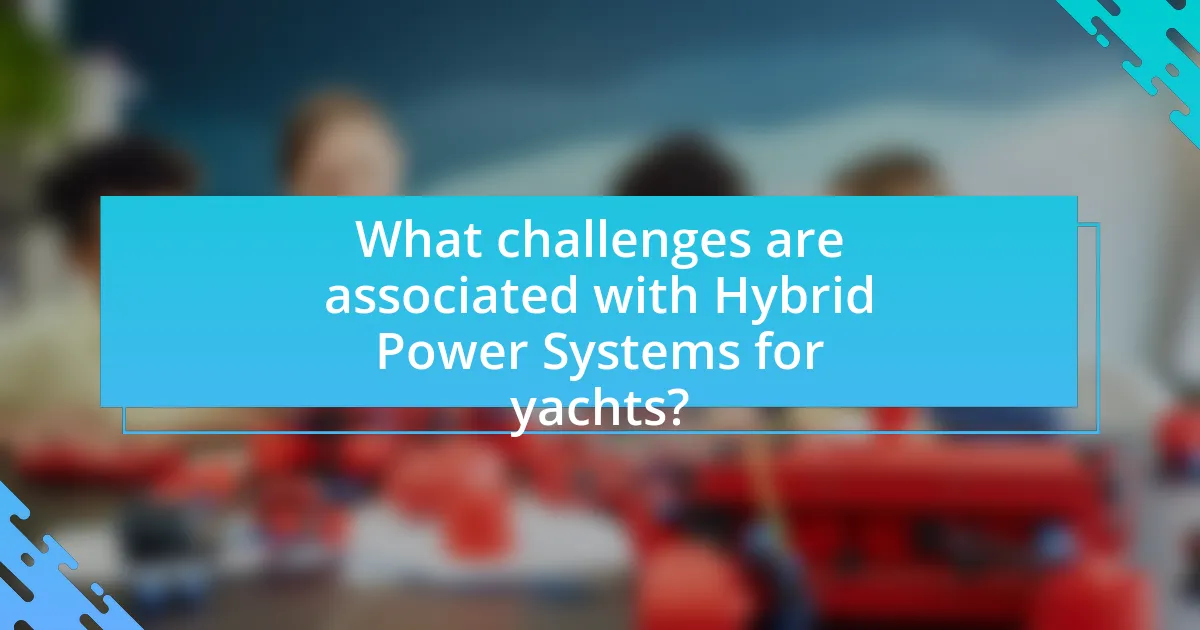
What challenges are associated with Hybrid Power Systems for yachts?
Hybrid power systems for yachts face several challenges, including complexity in system integration, high initial costs, and maintenance requirements. The integration of multiple power sources, such as diesel engines and batteries, can lead to technical difficulties in ensuring seamless operation and efficiency. High initial costs arise from the advanced technology and components required for hybrid systems, which can deter potential buyers. Additionally, maintenance of hybrid systems can be more demanding due to the need for specialized knowledge and parts, complicating service and repair processes. These challenges can impact the overall adoption and effectiveness of hybrid power systems in the yachting industry.
What are the common misconceptions about Hybrid Power Systems?
Common misconceptions about Hybrid Power Systems include the belief that they are overly complex and expensive to implement. In reality, while hybrid systems can involve multiple energy sources, advancements in technology have simplified their integration and reduced costs significantly. For instance, a study by the International Renewable Energy Agency (IRENA) found that the cost of hybrid systems has decreased by approximately 30% over the past decade, making them more accessible for applications such as yachts. Another misconception is that hybrid systems are less efficient than traditional power systems; however, research indicates that hybrid systems can optimize fuel consumption and reduce emissions, enhancing overall efficiency.
How can yacht owners address concerns about maintenance and reliability?
Yacht owners can address concerns about maintenance and reliability by implementing a regular maintenance schedule and utilizing hybrid power systems. Regular maintenance, including engine checks, hull inspections, and equipment servicing, ensures that all components function optimally, reducing the likelihood of breakdowns. Hybrid power systems, which combine traditional engines with electric propulsion, enhance reliability by providing backup power options and reducing wear on mechanical components. Studies indicate that yachts equipped with hybrid systems experience lower maintenance costs and increased operational reliability, as they can operate more efficiently and with less strain on engines.
What are the limitations of Hybrid Power Systems in certain conditions?
Hybrid Power Systems face limitations in efficiency and reliability under specific conditions such as extreme weather, high energy demand, and inadequate renewable resource availability. For instance, during prolonged periods of low sunlight or wind, the reliance on solar panels or wind turbines can lead to insufficient energy generation, necessitating increased use of backup fossil fuel generators. Additionally, in harsh marine environments, such as rough seas, the performance of hybrid systems can be compromised, affecting their operational stability and maintenance needs. These factors highlight the challenges of integrating hybrid systems effectively in varying maritime conditions.
How can yacht owners effectively implement Hybrid Power Systems?
Yacht owners can effectively implement Hybrid Power Systems by integrating both traditional diesel engines and electric propulsion systems to optimize fuel efficiency and reduce emissions. This integration allows for flexible power management, enabling the yacht to operate on electric power during low-speed maneuvers or in environmentally sensitive areas, while utilizing diesel engines for higher speeds or longer distances.
To ensure successful implementation, yacht owners should conduct a thorough assessment of their power needs, considering factors such as vessel size, intended use, and operational patterns. Additionally, selecting high-quality components, such as energy storage systems and efficient generators, is crucial for maximizing performance.
Research indicates that hybrid systems can reduce fuel consumption by up to 30% and significantly lower greenhouse gas emissions, making them a sustainable choice for yacht owners. Furthermore, the adoption of hybrid technology can enhance the overall value of the yacht, as more buyers are seeking eco-friendly options in the market.
What factors should be considered when choosing a Hybrid Power System?
When choosing a Hybrid Power System for yachts, key factors include energy efficiency, system compatibility, and operational costs. Energy efficiency is crucial as it determines how effectively the system converts fuel into usable energy, impacting overall performance and environmental footprint. System compatibility ensures that the hybrid components, such as batteries, generators, and propulsion systems, work seamlessly together, which is essential for reliability and maintenance. Operational costs encompass both initial investment and ongoing expenses, including fuel consumption and maintenance, which can significantly affect the yacht’s long-term financial viability.
How can yacht owners ensure optimal performance from their Hybrid Power Systems?
Yacht owners can ensure optimal performance from their Hybrid Power Systems by regularly maintaining and calibrating the system components, including batteries, generators, and electric motors. Regular maintenance, such as checking battery health and ensuring proper connections, enhances efficiency and longevity. Additionally, owners should monitor energy consumption patterns and adjust usage to maximize the benefits of hybrid technology, which can lead to reduced fuel consumption and lower emissions. Studies indicate that proper management of hybrid systems can improve fuel efficiency by up to 30%, demonstrating the importance of proactive maintenance and monitoring for optimal performance.
What are the best practices for maintaining Hybrid Power Systems on yachts?
The best practices for maintaining Hybrid Power Systems on yachts include regular inspections, software updates, and battery management. Regular inspections ensure that all components, such as generators, batteries, and inverters, are functioning correctly and efficiently. Software updates are crucial as they enhance system performance and security, addressing any bugs or vulnerabilities. Effective battery management involves monitoring charge cycles and maintaining optimal temperature ranges to prolong battery life. These practices are supported by industry standards, which emphasize the importance of routine maintenance to prevent system failures and ensure reliability in hybrid power systems.


